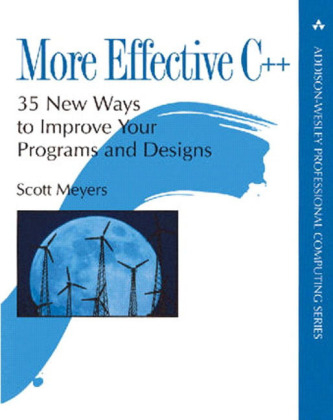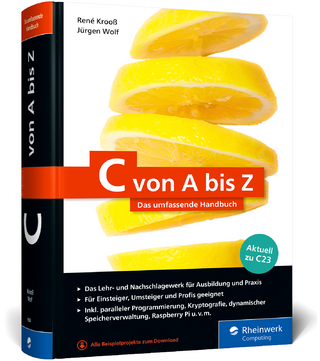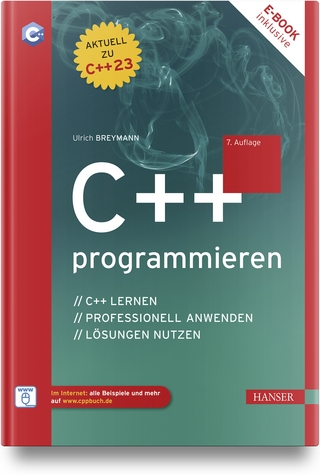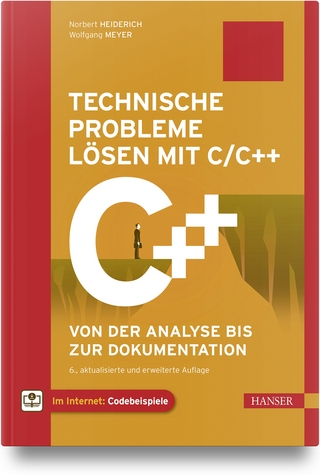
More Effective C++
Addison Wesley (Verlag)
978-0-201-63371-9 (ISBN)
- Titel ist leider vergriffen;
keine Neuauflage - Artikel merken
More than 150,000 copies in print!
Praise for Scott Meyers’ first book, Effective C++:
“I heartily recommend Effective C++ to anyone who aspires to mastery of C++ at the intermediate level or above.”
– The C/C++ User’s Journal From the author of the indispensable Effective C++, here are 35 new ways to improve your programs and designs. Drawing on years of experience, Meyers explains how to write software that is more effective: more efficient, more robust, more consistent, more portable, and more reusable. In short, how to write C++ software that’s just plain better.
More Effective C++ includes:
Proven methods for improving program efficiency, including incisive examinations of the time/space costs of C++ language features
Comprehensive descriptions of advanced techniques used by C++ experts, including placement new, virtual constructors, smart pointers, reference counting, proxy classes, and double-dispatching
Examples of the profound impact of exception handling on the structure and behavior of C++ classes and functions
Practical treatments of new language features, including bool, mutable, explicit, namespaces, member templates, the Standard Template Library, and more. If your compilers don’t yet support these features, Meyers shows you how to get the job done without them.
More Effective C++ is filled with pragmatic, down-to-earth advice you’ll use every day. Like Effective C++ before it, More Effective C++ is essential reading for anyone working with C++.
Scott Meyers is one of the world's foremost authorities on C++, providing training and consulting services to clients worldwide. He is the author of the best-selling Effective C++ series of books (Effective C++, More Effective C++, and Effective STL) and of the innovative Effective C++ CD. He is consulting editor for Addison Wesley's Effective Software Development Series and serves on the Advisory Board for The C++ Source (http://www.artima.com/cppsource). He holds a Ph.D. in Computer Science from Brown University. His web site is http://www.aristeia.com.
Acknowledgments xi
Introduction 1
Basics 9
Item 1: Distinguish between pointers and references. 9
Item 2: Prefer C++-style casts. 12
Item 3: Never treat arrays polymorphically. 16
Item 4: Avoid gratuitous default constructors. 19
Operators 24
Item 5: Be wary of user-defined conversion functions. 24
Item 6: Distinguish between prefix and postfix forms of increment and decrement operators. 31
Item 7: Never overload &&, ||, or ,. 35
Item 8: Understand the different meanings of new and delete. 38
Exceptions 44
Item 9: Use destructors to prevent resource leaks. 45
Item 10: Prevent resource leaks in constructors. 50
Item 11: Prevent exceptions from leaving destructors. 58
Item 12: Understand how throwing an exception differs from passing a parameter or calling a virtual function. 61
Item 13: Catch exceptions by reference. 68
Item 14: Use exception specifications judiciously. 72
Item 15: Understand the costs of exception handling. 78
Efficiency 81
Item 16: Remember the 80-20 rule. 82
Item 17: Consider using lazy evaluation. 85
Item 18: Amortize the cost of expected computations. 93
Item 19: Understand the origin of temporary objects. 98
Item 20: Facilitate the return value optimization. 101
Item 21: Overload to avoid implicit type conversions. 105
Item 22: Consider using op= instead of stand-alone op. 107
Item 23: Consider alternative libraries. 110
Item 24: Understand the costs of virtual functions, multiple inheritance, virtual base classes, and RTTI. 113
Techniques 123
Item 25: Virtualizing constructors and non-member functions. 123
Item 26: Limiting the number of objects of a class. 130
Item 27: Requiring or prohibiting heap-based objects. 145
Item 28: Smart pointers. 159
Item 29: Reference counting. 183
Item 30: Proxy classes. 213
Item 31: Making functions virtual with respect to more than one object. 228
Miscellany 252
Item 32: Program in the future tense. 252
Item 33: Make non-leaf classes abstract. 258
Item 34: Understand how to combine C++ and C in the same program. 270
Item 35: Familiarize yourself with the language standard. 277
Recommended Reading 285
An auto_ptr Implementation 291
General Index 295
Index of Example Classes, Functions, and Templates 313
| Erscheint lt. Verlag | 13.3.1996 |
|---|---|
| Reihe/Serie | Addison-Wesley Professional Computing Series |
| Verlagsort | Boston |
| Sprache | englisch |
| Maße | 189 x 234 mm |
| Gewicht | 658 g |
| Themenwelt | Informatik ► Programmiersprachen / -werkzeuge ► C / C++ |
| ISBN-10 | 0-201-63371-X / 020163371X |
| ISBN-13 | 978-0-201-63371-9 / 9780201633719 |
| Zustand | Neuware |
| Haben Sie eine Frage zum Produkt? |
aus dem Bereich


